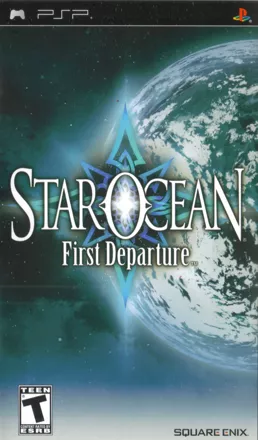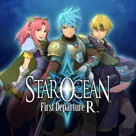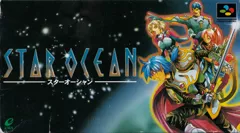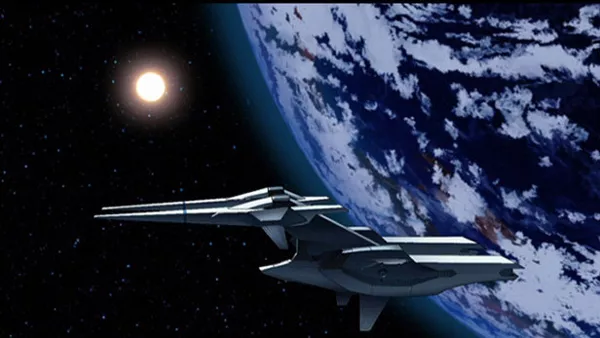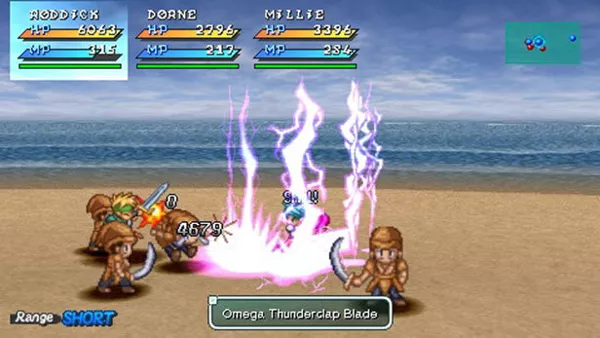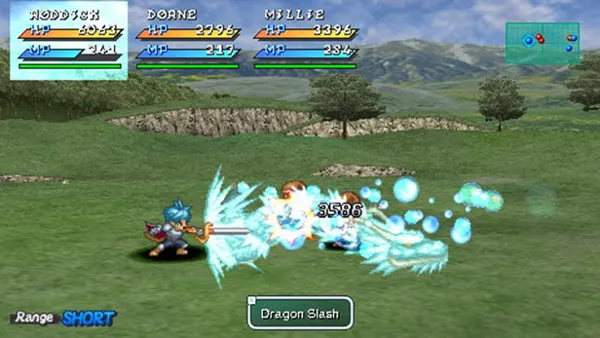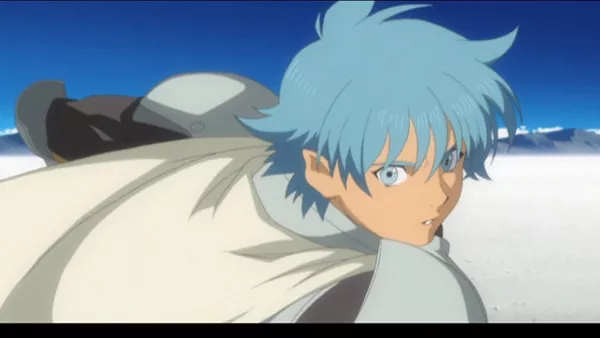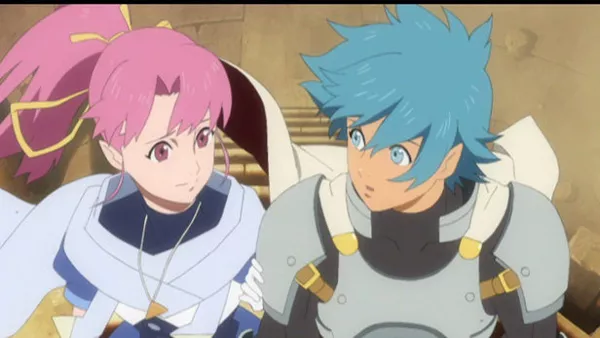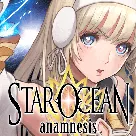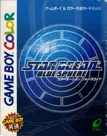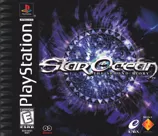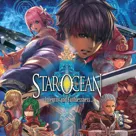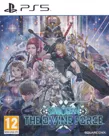Star Ocean: First Departure
Description official descriptions
Star Ocean: First Departure is an enhanced remake of the original Super Famicom game, Star Ocean, which was never released in North America. Developed as part of a plan to re-release the first two Star Ocean games for the Sony PSP.
Featuring more-detailed sprites, 3D landscapes, several anime cinematics, updated voice acting, new playable characters, and an official English translation. Even with all this new content, the game still manages to fit on a single UMD disc.
The story is essentially the same, and characters are able to train various skills and crafting professions, like in the original game. The new anime cut scenes can also be viewed from the title screen, once the player has seen them in-game.
Groups +
Promos
Credits (PSP version)
404 People · View all
| Voices |
|
| Additional Voices |
|
| [ full credits ] | |
Reviews
Critics
Average score: 74% (based on 40 ratings)
Players
Average score: 3.5 out of 5 (based on 14 ratings with 1 reviews)
The Good
I think it was science-fiction author J. G. Ballard who wrote that the ocean signified memory, while space symbolises the unconscious. As poetic and thoughtful as this may be, could this combination of these two realms inspire an interesting game? 'Star Ocean' certainly promises something in it's title, but does it come across in the final PSP adventure?
'Star Ocean' asks players to embark on a unusually flavoured journey: a mix of medieval fantasy and science fiction exploration. We've all seen traditional role-playing games where with a fantastic, mystical and magical flavour, but 'Star Ocean' has gone to the trouble to add another ingredient: an emphasis on inter-stellar and time travel. With this backdrop established, we take control of Roddick (or name him otherwise) and follow him and a party of your choosing across the continents of Roak. This world is depicted in typical style: several 'continents' are presented, each encrusted with various villages, hamlets, and kingdoms – nothing unusual there.
Quite strikingly, the game makes use of pre-rendered backdrops within these many locales, all which are highly detailed and quite beautifully presented. Players move a sprite (remember them?) of Roddick across these pre-rendered areas – the difference in graphical style is quite jarring at first – and the 'camera' aspect is set differently for each screen full of the area. Sometimes you'll walk left-to-right, diagonally, or even far into the distance – the camera remaining static as your sprite marches off into the distance. Open doors, visit stores, annoy citizens, hear stories, collect items and take in the scenery.
Where the game gives interest is in the item creation (a very unique, branching, customisable skill system unlocks this), the varied and memorable villages and towns, the great music, and the excellent animated scenes and voice-work. The characters sound suitable and not too dramatised, and the conversations aren't always a chore to get through – this is a nice change. And what is said by the characters and NPCs is mostly useful content, not fluff or filler, although it's occasionally obvious. They often draw conclusions that the player deduced two towns ago – but that's not too much too worry about.
Animated anime-style scenes bookend the most important moments in the game – and these shine through brilliantly on the PSPs terrific display. These animations are colourful, refreshing and add to the experience – they are only used too sparingly. They give the static characters a much needed breath of life. This would have been even more needed at the original date of release (did I mention this game was a re-make yet? Well it is).
Musically speaking, 'Star Ocean' is apt, if not too memorable. Dragon Warrior/Quest like music (although a little more subdued) seems to be as close as I can recall as to what 'Star Ocean' pipes out. While the themes aren't all that memorable, their flavour is welcomed and certainly add to the game's charms. The soundtrack is an evenly composed set, providing a consistent and persistent colour to the game tastefully.
The Bad
'First Departure' has a battle-system that is really quite bizarre. Random encounters trigger a battle-sequence, and then set 'field' area is presented. Real-time control is the name of the game, and by moving your character left, right, far or near, Roddick (or any other character you choose to control) will respond to X button tapping to attack with the equipped weapon. Special spell moves (assignable of course) are unleashed from the shoulder buttons. Some of these are neat, some are quite lame, and some are very dramatic and powerful. The latter can become annoying as some of the animations seem to take much too long: watching psychedelic asteroids bombard the battlefield in slow-motion is pretty amazing – the first couple of times.
Sadly, the real-time battling is not anywhere as exciting as it sounds or could have been. Strategic choice is not really needed, and rapid-tapping of the X button is what you'll be doing most of the time. Sure, you can unleash a speciality skill if you like, but it's not usually necessary and you'll probably do it just for the hell of it. Enemies are not that menacing or exciting either – sprite-based like the party, they animate very simply and are mostly just there to give experience. 'Star Ocean' is not for those who like 'Final Fantasy' style battles – it's just far too simplified and slash-happy. You've been advised...
Equipment settings and item management is a robust feature of 'Star Ocean'. Hitting the triangle button displays a 'Final Fantasy' busy-end of the party and all other details. Assigning skill points to an exhaustive list of available skills is how you improve your characters. Only those who've participated in battle will attain experience (EXP), so make sure you shuffle everyone around a bit. We all know what happens if you neglect a character – they become horrendously under-powered and virtually useless.
These menus are pretty complex for a game of this vintage, and I can only imagine how impressive this might have been in the '90s. Now, it is fairly standard, and today's games have learnt the slow but necessary lesson of arranging parameters logically and neatly – 'Star Ocean' manages the former only just, and the latter quite well. Finding an item can be tricky: (should I look in 'Single-use Items', 'Newly-acquired', 'Other', or 'Food'?). 'Newly-acquired' sounds like a useful shortcut, but from what this player can determine, this sub-menu lists the items in reverse-order: oldest first!
The Bottom Line
'Star Ocean' gives modern players a look at what Japanese gamers have known for a decade. The question is: is this secret worth knowing? On the whole, this player says 'yes', but with conditions. Don't try this title if you want strategy. Don't try this title if you have become accustomed to modern role-playing characterisations and customisability – they're just not here. But do try this game if you are (like I am) interested in unusual role-playing game experiments, for 'Star Ocean' does stand out as a bit of a freak in the scheme of things. This is why it has been unearthed and re-released – 'Star Ocean' has an originality that gives it some credence in the modern world of sophisticated role-playing.
PSP · by So Hai (261) · 2010
Analytics
Identifiers +
Contribute
Are you familiar with this game? Help document and preserve this entry in video game history! If your contribution is approved, you will earn points and be credited as a contributor.
Contributors to this Entry
Game added by Doppelgamer.
Game added December 23, 2008. Last modified January 1, 2025.


